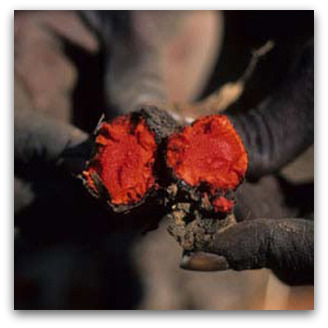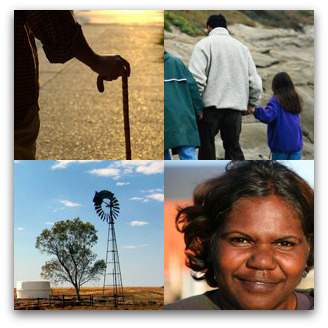Keywords: Northern Territory Intervention
-

ARTS AND CULTURE
- Ellena Savage
- 19 August 2011
3 Comments
On my last night in Alice, we went to the pub, and drank and danced with some locals. Patricia, for whom English was a fourth language, had moved to Alice to be with her husband. Her manner of speech was beautiful. When she invited us to her table, she said, 'Come, I'll tell you a story.'
READ MORE 
-

RELIGION
- Frank Brennan
- 02 May 2011
1 Comment
Jesuit Social Services recently set up a project in Alice Springs to resource the local parish and local Aborigines who want to take more control of their own lives. If we are to get our teeth into issues of acute injustice, we need to eyeball both the decision makers and those affected by those decisions.
READ MORE
-

EUREKA STREET TV
- Peter Kirkwood
- 25 March 2011
2 Comments
READ MORE 
-

EUREKA STREET TV
- Peter Kirkwood
- 25 March 2011
1 Comment
Earlier this year Frank Brennan celebrated the 25th anniversary of his ordination as a Jesuit priest. Former Prime Minister Paul Keating once dubbed him a 'meddling priest', a label he accepts with mixed feelings.
READ MORE 
-

INFORMATION
- Jenny Macklin
- 17 March 2011
18 Comments
Dear Father Brennan, I do not accept the way you have characterised the Government's actions in relation to the Racial Discrimination Act 1975 and the Intervention, and am concerned that your article could mislead people into considering that the Government's measures in the NT are discriminatory.
READ MORE
-

RELIGION
- Frank Brennan
- 13 February 2011
9 Comments
Three years since Kevin Rudd's National Apology to the Stolen Generations, discriminatory aspects of John Howard's Intervention are still in place. Let's hope that by the fourth anniversary, we are no longer singling out Aborigines for such 'special treatment'.
READ MORE 
-

AUSTRALIA
- Sarah Burnside
- 09 February 2011
7 Comments
There is evidence that, far from its stated aim of 'normalising' remote communities, the Intervention is in fact counter-productive. A few days out from the anniversary of the Apology to the Stolen Generations, the question hovers: when will the Intervention end?
READ MORE 
-

AUSTRALIA
- Myrna Tonkinson
- 14 January 2011
Not yet 40, she must live in Perth, hundreds of kilometres from home, to receive dialysis. She is currently in hospital recovering from spinal surgery, and so is separated even from her city-based loved ones. Yet she appears always with a beaming smile.
READ MORE 
-

MARGARET DOOLEY AWARD
- Jonathan Hill
- 01 December 2010
5 Comments
Dhurga is a dead language. At my school however it is taught to every student, Indigenous and non-Indigenous. A subject like this is quite radical in an education system that is heavily focused on churning out workers rather than thinkers.
READ MORE
-

AUSTRALIA
- Michael Mullins
- 01 November 2010
2 Comments
At the time of the Apology to the Stolen Generations in February 2008, former Prime Minister Kevin Rudd committed Labor to halving the gap in employment incomes within a decade. It is now looking like another great moral challenge that Labor has given up on.
READ MORE 
-

AUSTRALIA
- John Falzon
- 20 August 2010
20 Comments
Ngunnawal Elder Aunty Janet Phillips says that for Aboriginal Australians
there's no 'justice'; 'just us'.
How can we turn this election into a building block for a more equal society?
The answer involves weighing up the known
policies and track-record of both sides to assess their
impact on the growth of inequality.
READ MORE
-

AUSTRALIA
- Frank Quinlan
- 18 August 2010
11 Comments
This election we consider a PM who is doubted because of her
atheism, an Opposition Leader who is doubted for being too 'Catholic', and the Greens who are
doubted as being anti-Christian. Church social agencies have been involved in important issues with each of these groups.
READ MORE 